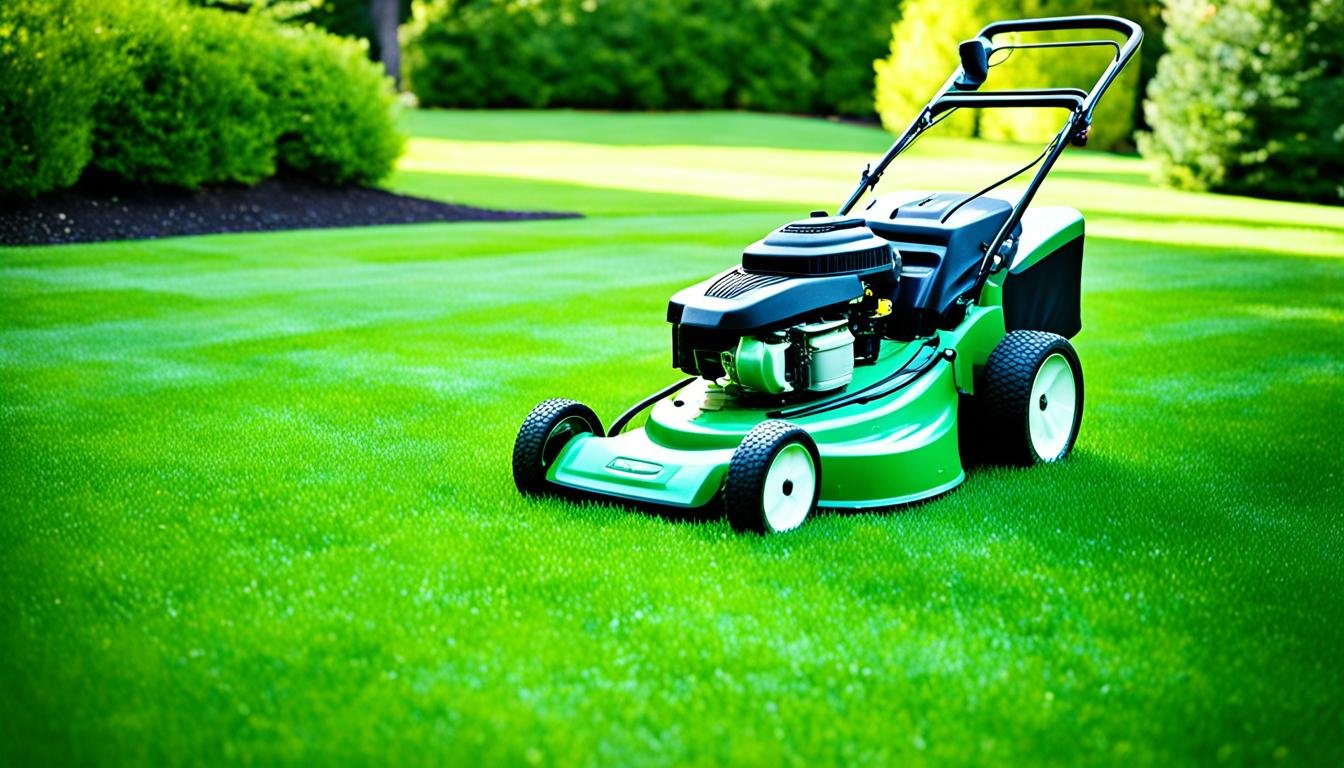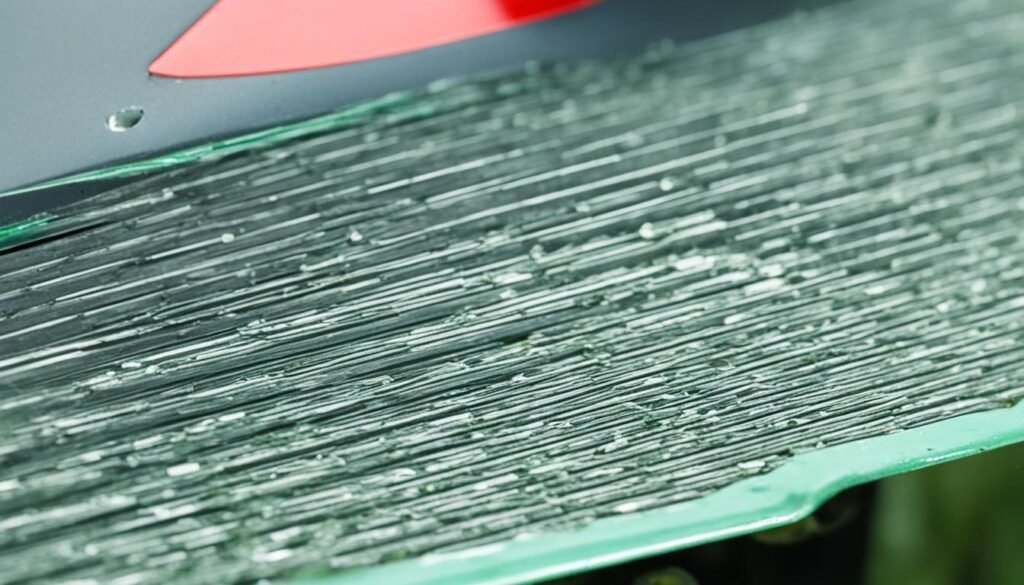
Did you know that regular lawnmower maintenance can extend its lifespan by up to 50%? Taking care of your lawnmower is not only essential for optimal performance but also for saving you money in the long run. By following a few simple tips and best practices, you can ensure that your lawnmower runs smoothly and efficiently all year round. Whether you are a DIY enthusiast or prefer to hire a professional lawnmower service, these maintenance techniques will help you keep your lawnmower in top shape.
- Perform regular maintenance tasks such as changing the engine oil, replacing spark plugs and air filters, sharpening blades, and keeping the mower clean.
- Timing is crucial – perform maintenance at the beginning or end of the season, depending on your geographical location.
- Follow an annual maintenance checklist that includes tasks like changing the engine oil, adding fuel stabilizer, replacing spark plugs and air filters, sharpening and balancing the blades, and fogging the engine if necessary.
- Whether you choose professional lawnmower servicing or DIY maintenance, familiarize yourself with the owner’s manual and follow manufacturer instructions.
- Store your lawnmower properly during the off-season to protect your investment and ensure trouble-free operation.
Key Takeaways:
- Regular lawnmower maintenance can extend its lifespan by up to 50%.
- Perform maintenance tasks such as changing oil, replacing spark plugs and air filters, sharpening blades, and keeping the mower clean.
- Timing is crucial – perform maintenance at the beginning or end of the season.
- Follow an annual maintenance checklist that includes tasks like changing oil, adding fuel stabilizer, replacing spark plugs and air filters, sharpening and balancing blades, and fogging the engine if necessary.
- Whether you choose professional servicing or DIY maintenance, follow the owner’s manual and manufacturer instructions.
When to Perform Lawn Mower Maintenance
Regular maintenance is essential to keep your lawn mower in optimal condition throughout the year. But when is the best time to perform this crucial task? The timing for lawn mower maintenance can vary depending on the geographical location and climate. However, two key periods stand out: the beginning of the season and the end of the season.
Performing lawn mower maintenance at the beginning of the season, before the first mow, ensures that your mower is in top shape for the months ahead. This allows you to tackle your lawn with ease, knowing that your mower is working efficiently. Additionally, beginning-of-the-season maintenance helps identify any issues or necessary repairs early on, preventing bigger problems down the line.
On the other hand, end-of-the-season maintenance is equally crucial for the longevity of your lawn mower. before storing it away for the winter months. Properly preparing your mower for storage helps prevent damage caused by prolonged exposure to harsh weather conditions and months of inactivity. By cleaning, inspecting, and maintaining your mower before storing it, you’ll ensure a smooth start to the next mowing season.
Whether you choose to perform maintenance at the beginning or end of the season, establishing a regular maintenance schedule is key. By staying consistent, you can keep your mower in great shape year after year and avoid costly repairs. Remember, a well-maintained lawn mower not only provides a beautifully manicured lawn but also saves you time and money in the long run.

Annual Lawn Mower Maintenance Checklist
To keep your lawnmower in top condition, it’s essential to follow an annual maintenance checklist. By performing these tasks regularly, you can ensure that your lawnmower operates at its best and maintains optimal performance throughout the year.
1. Change the Engine Oil
Regularly changing the engine oil is key to maintaining the longevity of your lawnmower. Over time, the oil can become contaminated and lose its effectiveness, causing potential engine damage. Refer to your lawnmower’s manual for specific instructions on how to change the oil and the recommended oil type to use.
2. Add Fuel Stabilizer or Remove Fuel
If your lawnmower will not be used for more than 30 days, it’s advisable to add a fuel stabilizer to the gasoline. This helps prevent fuel degradation and keeps the engine running smoothly. Alternatively, if you don’t plan on using the mower for an extended period, it’s recommended to drain and remove all fuel from the tank to prevent fuel-related issues.
3. Replace the Spark Plug
The spark plug plays a vital role in igniting the fuel-air mixture in the engine. Over time, spark plugs can become fouled or worn, leading to poor engine performance. Regularly inspect and replace the spark plug as needed to ensure reliable starting and efficient fuel combustion.
4. Clean or Replace the Air Filter
The air filter prevents dirt, debris, and other contaminants from entering the engine. A dirty or clogged air filter restricts airflow and can result in reduced engine performance. Clean or replace the air filter according to the manufacturer’s recommendations to maintain optimal engine efficiency.
5. Sharpen and Balance the Blades
Dull or unbalanced blades can result in an uneven cut and can strain the lawnmower’s engine. Regularly inspect the mower blades for sharpness and balance, and sharpen or replace them as necessary. This will ensure a clean and even cut while reducing strain on the mower’s engine.
6. Keep the Mower Clean
Regularly cleaning your lawnmower helps remove grass clippings, dirt, and debris that can accumulate and affect its performance. Use a brush or compressed air to clean the mower’s exterior, wheels, and undercarriage. Always refer to the manufacturer’s instructions for cleaning and maintenance.
7. Fog the Engine (if necessary)
In regions with extended periods of non-use or during winter storage, it may be necessary to fog the engine. Fogging the engine helps protect internal components and prevents corrosion. Follow the manufacturer’s instructions on how to correctly fog the engine and ensure trouble-free operation when the mower is brought out of storage.

Following this annual lawnmower maintenance checklist will help extend the life of your lawnmower and ensure it operates at its best. By taking care of your lawnmower with regular maintenance, you’ll enjoy efficient performance and a well-maintained yard for years to come.
Expert Tips for Lawn Mower Maintenance
Whether you decide to hire a professional lawnmower service or take on the task yourself, there are some expert tips that can help you achieve success in maintaining your lawnmower. To begin with, it is crucial to familiarize yourself with the owner’s manual and diligently follow the manufacturer’s instructions for maintenance. This will ensure that you are taking the appropriate steps to care for your specific lawnmower model.
For safety purposes, it is highly recommended to disconnect or remove the spark plug before commencing any maintenance work on the lawnmower. This will prevent any unintentional starting of the engine. Additionally, it is important to follow proper procedures for draining and replacing the gasoline, cleaning the mower, replacing or topping up the oil, and cleaning or replacing the air filter. Neglecting these tasks can lead to performance issues and reduce the lifespan of your lawnmower.
One of the key elements of lawnmower maintenance is ensuring that the blades are sharpened and balanced regularly. Dull blades can cause uneven cutting and put unnecessary strain on the engine. By maintaining sharp and balanced blades, you can achieve a cleaner and more efficient cut. Lastly, don’t forget about proper storage during the off-season. Storing your lawnmower in a clean, dry, and secured area will protect it from the elements and extend its overall lifespan.
While DIY lawnmower maintenance can be rewarding, it is also worth considering professional lawnmower servicing. Companies like GreenThumb and TruGreen offer comprehensive lawnmower maintenance programs that take care of all the necessary tasks and provide peace of mind. These programs often include regular servicing, inspection, and adjustment of key components, ensuring trouble-free operation and protecting your investment in your lawnmower. Hiring professionals can save you time and effort while ensuring that your lawnmower receives the highest quality care.






No comment yet, add your voice below!